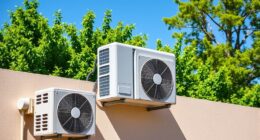Are you unsure about transitioning to heat pump technology for your home’s HVAC system? We understand.
But let us assure you, this curated guide is packed with all the technical details and informative insights you need to understand the advantages of heat pump technology.
From how they work to the energy efficiency they offer, we’ll explore the future of this innovative system and why it’s worth considering for your home.
Get ready to experience a whole new level of comfort and innovation.

Key Takeaways
- Heat pumps provide efficient heating and cooling with lower energy consumption.
- Geothermal heat pumps utilize the constant temperature of the earth for efficient heating and cooling.
- Heat pumps consume less energy compared to traditional heating and cooling systems, resulting in reduced utility bills.
- Heat pump technology contributes to environmental preservation by reducing greenhouse gas emissions.
The Basics of Heat Pump Technology
We’ll start by explaining how a heat pump works in simple terms. A heat pump is a device that transfers heat from one place to another, typically from a lower temperature to a higher temperature. It operates on the principle of refrigeration, using a refrigerant to absorb heat from the outdoor air or ground and then releasing it indoors. This process can be reversed for cooling purposes.
Understanding the operation of a heat pump is essential for appreciating its benefits and drawbacks. One major benefit is its energy efficiency. By transferring heat rather than generating it, a heat pump can provide efficient heating and cooling with lower energy consumption compared to traditional HVAC systems. It also offers versatility, as it can be used for both heating and cooling.
However, there are some drawbacks to consider. Heat pumps may struggle to maintain optimal performance in extremely cold climates, as the outdoor air temperature affects their efficiency. Additionally, heat pumps require a significant initial investment, although the long-term energy savings can offset this cost.
Understanding How Heat Pumps Work
To understand how heat pumps work, we need to examine the process of heat transfer and refrigeration. Heat pumps operate by transferring heat from one area to another using a refrigerant that absorbs and releases heat as it circulates through the system. This process involves several key steps:
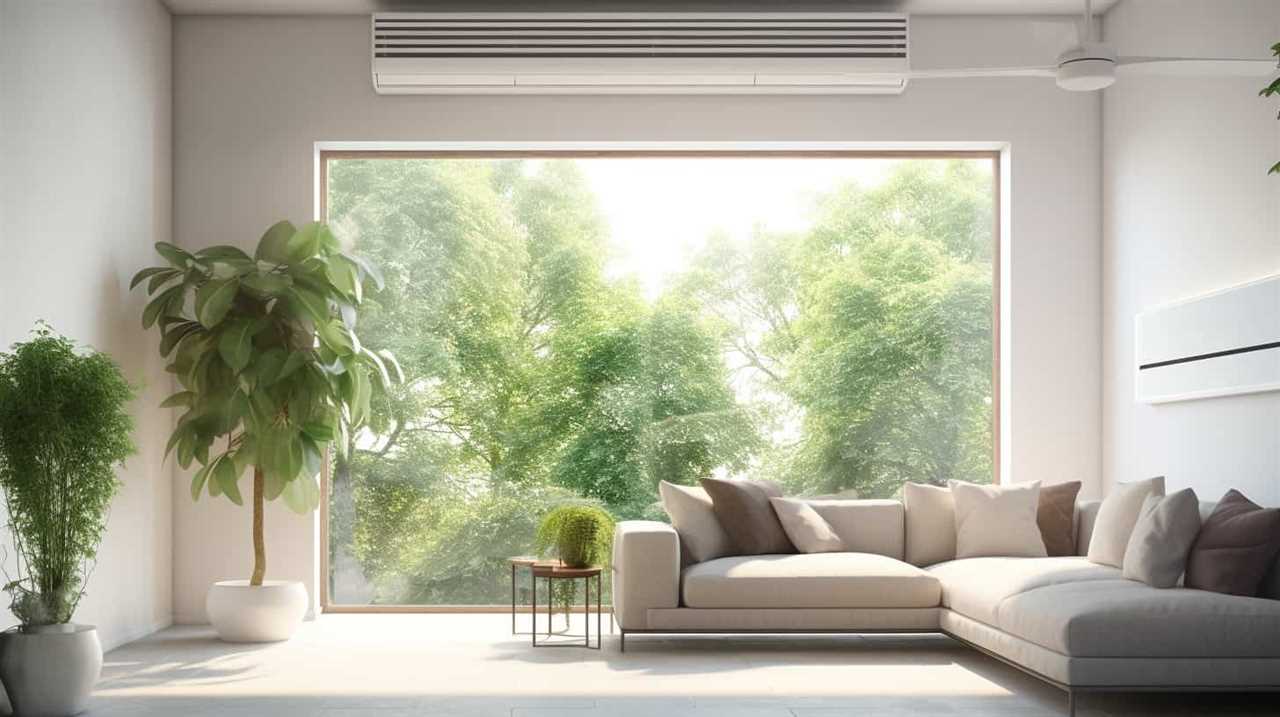
- Evaporation: The refrigerant evaporates, absorbing heat from the surrounding air or ground.
- Compression: The vaporized refrigerant is compressed, increasing its temperature and pressure.
- This compression is achieved by a compressor, which requires electricity to function.
- Condensation: The hot, pressurized refrigerant condenses, releasing heat into the desired space.
- Expansion: The refrigerant expands, lowering its temperature and returning to its initial state.
To ensure optimal heat pump operation and longevity, regular maintenance is essential. This includes cleaning or replacing air filters, inspecting and lubricating moving parts, checking refrigerant levels, and verifying electrical connections. With proper heat pump maintenance, homeowners can enjoy efficient and reliable HVAC performance.
Now, let’s explore the different types of heat pumps for residential HVAC systems.
Different Types of Heat Pumps for Residential HVAC
For residential HVAC systems, there are various types of heat pumps available, each with its own unique features and advantages.
One type of heat pump that’s gaining popularity is the geothermal heat pump. It utilizes the constant temperature of the earth to provide efficient heating and cooling.

One of the major advantages of geothermal heat pumps is their high energy efficiency. They can provide heating and cooling at a fraction of the cost of traditional HVAC systems.
Additionally, geothermal heat pumps have a longer lifespan compared to other heat pump types.
When selecting a heat pump system for residential HVAC, it’s important to consider factors such as the size of the space, climate conditions, and the desired level of energy efficiency.
Energy Efficiency: The Advantages of Heat Pump Technology
Our heat pump technology offers significant energy efficiency benefits, making it an excellent choice for residential HVAC systems. Here are some key advantages of heat pump technology and the energy efficiency benefits it provides:

Lower Energy Consumption:
Heat pumps consume less energy compared to traditional heating and cooling systems, resulting in reduced utility bills.
They utilize electricity to transfer heat, rather than generating it through combustion, making them more energy efficient.
Renewable Energy Integration:
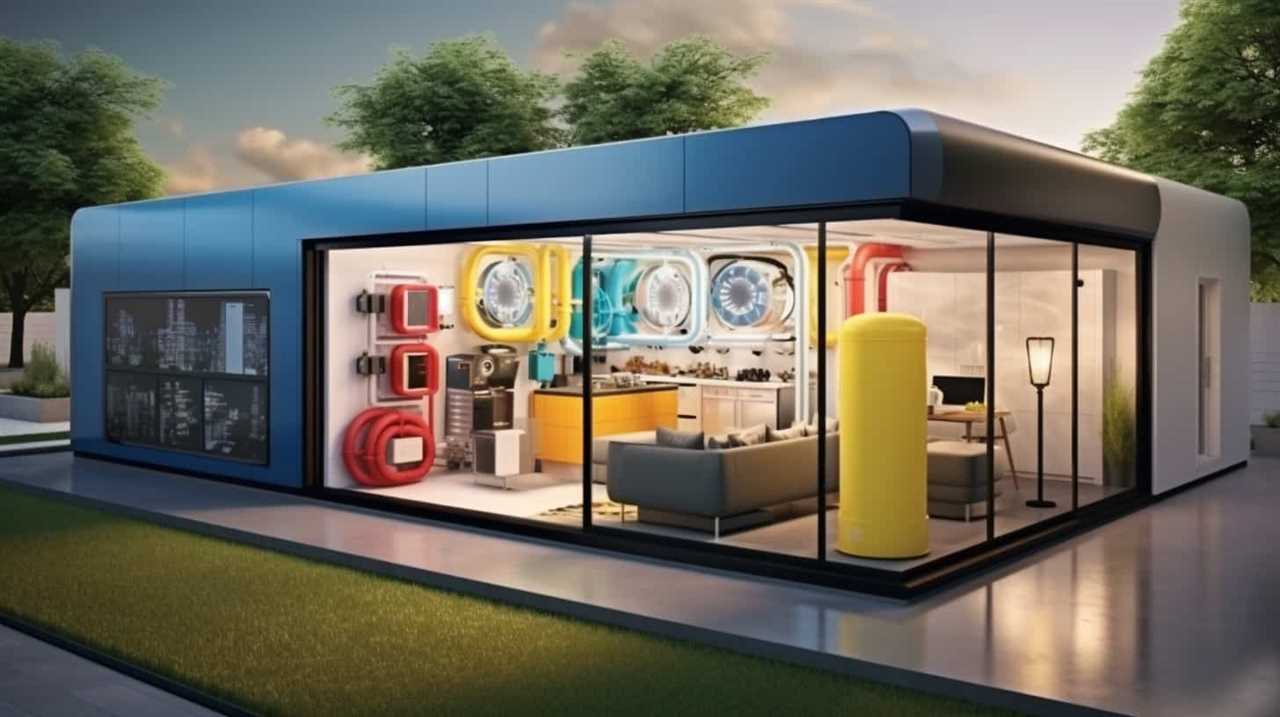
Heat pumps can be integrated with renewable energy sources, such as solar panels, to further increase energy efficiency and reduce carbon emissions.
By harnessing renewable energy, heat pumps help to minimize reliance on fossil fuels and contribute to a greener, more sustainable future.
Heat pump technology not only provides superior energy efficiency but also contributes to environmental preservation by reducing greenhouse gas emissions. Its innovative design and ability to integrate with renewable energy sources make it a promising solution for the future of residential HVAC systems.
Comparing Heat Pumps to Traditional HVAC Systems
When comparing heat pumps to traditional HVAC systems, there are several key points to consider.

First, we need to analyze the efficiency comparison between the two. This includes examining the heating and cooling capacities, as well as the energy consumption of each system.
Additionally, we need to evaluate the installation cost difference between heat pumps and traditional HVAC systems, taking into account factors such as equipment, labor, and any necessary modifications to the existing infrastructure.
Lastly, it’s important to assess the environmental impact of both systems, considering factors such as greenhouse gas emissions and overall energy efficiency.
Efficiency Comparison
We have found that heat pumps are significantly more efficient than traditional HVAC systems in terms of energy consumption. This increased efficiency translates into cost effectiveness and a reduced environmental impact. Here are two key points to consider:

Energy Savings:
Heat pumps can provide up to four times the amount of energy they consume, making them highly efficient in converting electricity into heat or cool air.
Traditional HVAC systems, on the other hand, rely solely on electricity or fossil fuels for heating and cooling, resulting in higher energy consumption and costs.
Environmental Benefits:

Heat pumps produce fewer greenhouse gas emissions compared to traditional HVAC systems, as they don’t burn fossil fuels directly.
By opting for a heat pump, homeowners can contribute to the reduction of carbon emissions and help combat climate change.
Considering these energy and environmental advantages, it becomes clear that heat pumps are a superior choice compared to traditional HVAC systems. Now let’s explore the installation cost difference.
Installation Cost Difference
The installation cost difference between heat pumps and traditional HVAC systems can vary depending on factors such as the size of the system and the complexity of the installation process. To give you a clearer picture, let’s compare the installation time and maintenance requirements of these two systems using a table:

| Heat Pump | Traditional HVAC System | |
|---|---|---|
| Installation Time | Typically longer | Typically shorter |
| Maintenance Requirements | Regular filter changes, periodic check-ups, occasional refrigerant recharge | Regular filter changes, periodic check-ups, occasional refrigerant recharge |
When it comes to installation time, heat pumps generally require a longer process compared to traditional HVAC systems. This is because heat pumps involve additional steps such as drilling boreholes or installing ground loops for geothermal systems. On the other hand, traditional HVAC systems are more straightforward in terms of installation.
In terms of maintenance requirements, both systems have similar needs. Regular filter changes, periodic check-ups, and occasional refrigerant recharge are necessary for both heat pumps and traditional HVAC systems.
With the understanding of the installation cost difference, let’s now move on to analyzing the environmental impact of these systems.
Environmental Impact Analysis
To accurately assess the environmental impact, we’ll compare the heat pumps to traditional HVAC systems. When conducting a life cycle assessment (LCA) of residential HVAC systems, it’s crucial to consider the carbon footprint analysis.

Here are two key points to consider:
Efficiency: Heat pumps are known for their high efficiency in converting energy into heat or cool air. Compared to traditional HVAC systems, heat pumps can achieve significantly higher energy efficiency ratios (EER) and coefficient of performance (COP) values. This means that heat pumps consume less energy and produce fewer greenhouse gas emissions during operation.
Refrigerant Selection: Heat pumps utilize refrigerants to transfer heat between the indoor and outdoor units. Traditional HVAC systems often use refrigerants with high global warming potential (GWP), contributing to greenhouse gas emissions. However, advancements in heat pump technology have led to the development of environmentally friendly refrigerants with lower GWPs, reducing their overall environmental impact.
Choosing the Right Size Heat Pump for Your Home
When selecting a heat pump for our home, it’s important to choose the right size for optimal performance and energy efficiency. To ensure the correct sizing, it’s recommended to follow a heat pump sizing guide that takes into account various factors.

The first factor to consider is the climate zone in which your home is located. Different climate zones require different heat pump sizes to meet the heating and cooling demands.
Another important factor is the size of your home. Larger homes will require larger heat pumps to adequately heat and cool the space.
Additionally, the level of insulation in your home plays a crucial role in determining the right size heat pump. A well-insulated home will require a smaller heat pump compared to a poorly insulated one.
Other factors to consider include the number of windows, orientation of the house, and the presence of any additional heat sources.

Installation and Maintenance of Heat Pump Systems
We should carefully consider the installation and maintenance of our heat pump systems to ensure optimal performance and longevity. Proper installation is crucial to ensure that the system operates efficiently and effectively.
Here are some maintenance tips and a troubleshooting guide to help you keep your heat pump in top condition:
Maintenance Tips:
Regularly clean or replace air filters to ensure proper airflow.
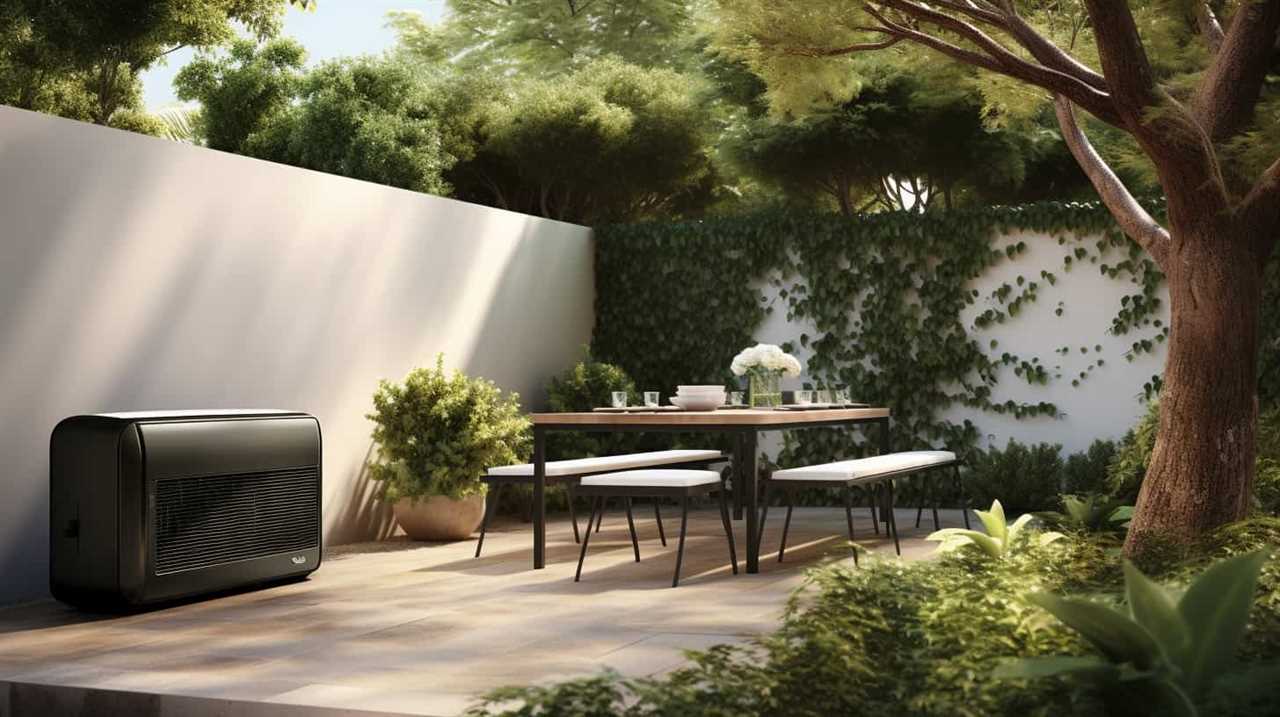
Schedule annual professional maintenance to check for any issues and ensure optimal performance.
Troubleshooting Guide:
If the heat pump doesn’t turn on, check the power supply and thermostat settings.
If the system isn’t heating or cooling properly, check for blocked airflow or refrigerant leaks.

If unusual noises or odors are present, contact a professional for inspection and repair.
Following these maintenance tips and troubleshooting guide will help you keep your heat pump system running smoothly and efficiently.
Common Issues and Troubleshooting Tips for Heat Pumps
When it comes to heat pumps, there are a few common issues that homeowners may encounter. One of these issues is a noisy heat pump, which can be caused by a variety of factors such as loose parts or a malfunctioning fan motor.
Another common issue is inconsistent heating or cooling, which can be a result of a refrigerant leak or a faulty thermostat.

In the following discussion, we’ll provide troubleshooting tips for these issues to help homeowners resolve them effectively.
Noisy Heat Pump
Our troubleshooting tips will help you identify and address common issues that cause a noisy heat pump. When your heat pump starts making excessive noise, it’s important to act promptly to prevent further damage. Here are some maintenance techniques and troubleshooting tips to address the noise issue:
Check for loose components: Inspect the fan blades, motor mounts, and compressor for any loose or damaged parts. Tighten or replace any loose or worn-out components to eliminate vibrations that can cause noise.
Clean or replace air filters: Dirty air filters can restrict airflow and put strain on the system, leading to increased noise. Regularly clean or replace air filters to ensure proper airflow and reduce noise levels.

Inconsistent Heating or Cooling
To troubleshoot inconsistent heating or cooling with your heat pump, check for common issues and follow these troubleshooting tips. It’s important to ensure that your heat pump is operating efficiently to provide optimal temperature control in your home. Here are some common issues that may cause inconsistent heating or cooling, along with troubleshooting tips to improve efficiency and temperature control:
| Common Issue | Troubleshooting Tips |
|---|---|
| Dirty air filters | Clean or replace air filters regularly to ensure proper airflow. |
| Thermostat settings | Check and adjust thermostat settings to the desired temperature. |
| Refrigerant leaks | If you suspect a refrigerant leak, contact a professional technician to repair and recharge the system. |
| Insufficient insulation | Ensure your home is properly insulated to minimize heat loss. |
Enhancing Comfort With Heat Pump Technology
We can enhance comfort in our homes by utilizing heat pump technology. Heat pumps not only provide efficient heating and cooling but also offer additional benefits that contribute to a superior indoor environment. Here are two ways heat pump technology enhances comfort:
Improving Indoor Air Quality:
Heat pumps have built-in filtration systems that can remove dust, pollen, and other allergens from the air, improving the overall indoor air quality.

Some advanced heat pumps also have additional features such as UV lights or ionizers that help eliminate bacteria and viruses, ensuring a healthier living environment.
Optimizing Energy Consumption:
Heat pumps are highly energy-efficient, using electricity to transfer heat rather than generating it from scratch. This can result in significant energy savings compared to traditional heating and cooling systems.
Additionally, heat pumps can be equipped with smart thermostats that allow precise temperature control and scheduling, further optimizing energy consumption.

Geothermal Heat Pumps: Harnessing Earth’s Energy
Geothermal heat pumps use the earth’s energy and provide efficient heating and cooling for residential HVAC systems. By tapping into the constant temperature of the earth, these pumps offer a renewable heating and cooling solution that is both environmentally friendly and cost-effective.
Geothermal energy is harnessed through a series of pipes, known as a ground loop, which is buried underground. This loop absorbs heat from the earth during the winter and transfers it indoors, providing warmth. In the summer, the process is reversed, with heat from indoors being transferred to the cool earth, resulting in a cooling effect.
The following table highlights the advantages of geothermal heat pumps in comparison to traditional HVAC systems:
| Advantages of Geothermal Heat Pumps | ||
|---|---|---|
| Energy Efficiency | Sustainable | Cost Savings |
| Low Environmental Impact | Long Lifespan | Quiet Operation |
As we explore the future of heat pump technology, it is important to recognize the potential of geothermal energy as a renewable heating source. With advancements in design and technology, geothermal heat pumps have the potential to revolutionize the way we heat and cool our homes, providing a sustainable and efficient solution for years to come.
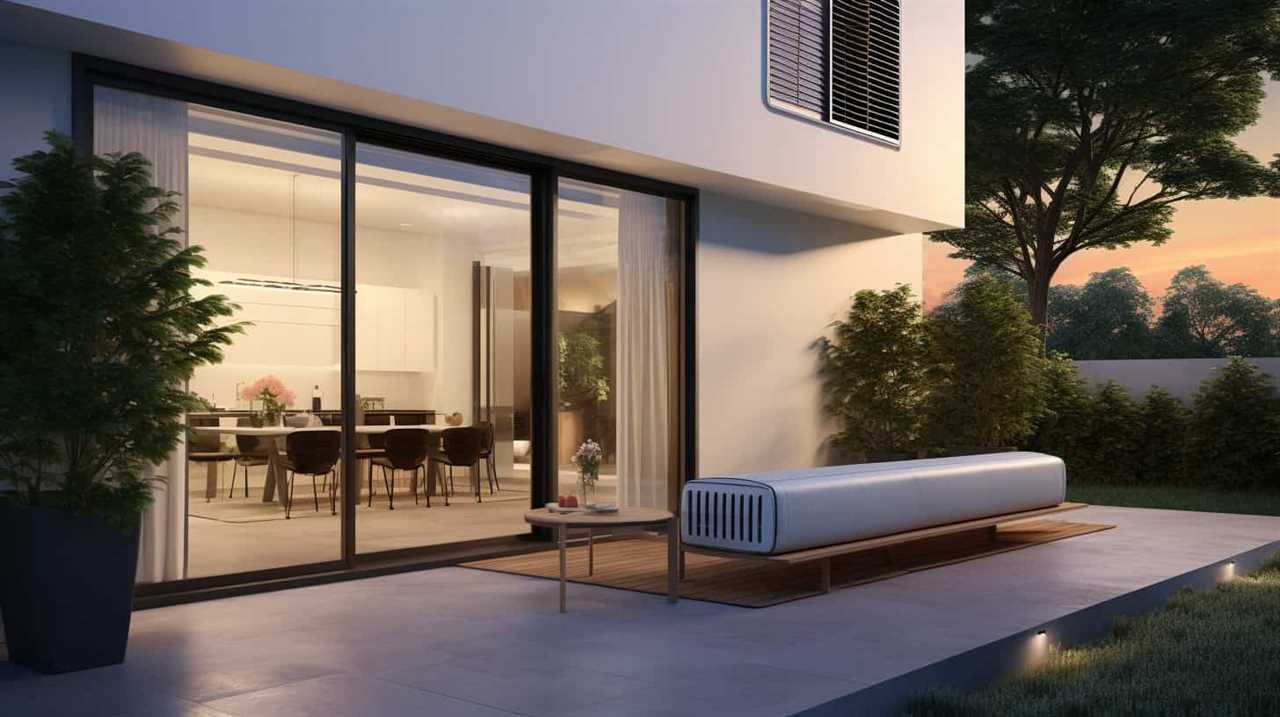
Exploring the Future of Heat Pump Technology
Our industry experts have identified several key advancements in heat pump technology that will shape the future of residential HVAC systems. These future advancements have the potential to greatly impact renewable energy sources.
Here are two areas of development that are expected to have a profound effect on the industry:
Increased Efficiency: Future heat pump systems will be designed with even higher efficiency ratings, allowing for greater energy savings and reduced carbon emissions. This will make them even more attractive to environmentally conscious consumers.
Integration with Smart Technology: Heat pumps of the future will be seamlessly integrated with smart home technology, allowing homeowners to control and monitor their HVAC systems remotely. This will provide greater convenience, energy management, and cost savings.

With these advancements on the horizon, it’s clear that heat pump technology will play a vital role in the future of residential HVAC systems, making them an excellent choice for homeowners looking to make the switch.
Making the Switch: Benefits of Installing a Heat Pump System
When considering the benefits of installing a heat pump system, two key advantages stand out: energy efficiency and cost savings potential.
Heat pumps are designed to transfer heat instead of generating it, making them highly efficient in heating and cooling homes. This energy efficiency can lead to significant cost savings on utility bills, as heat pumps require less energy to operate compared to traditional heating and cooling systems.
Energy Efficiency Advantages
We have found that one of the key advantages of installing a heat pump system is its energy efficiency. Heat pumps are designed to transfer heat rather than generate it, resulting in significant energy savings compared to traditional heating and cooling systems.

Here are two sub-lists that highlight the deeper meaning of this energy efficiency advantage:
Environmental Impact:
- Heat pumps use renewable energy sources such as the air, ground, or water, reducing reliance on fossil fuels and lowering greenhouse gas emissions.
- By operating more efficiently, heat pumps require less energy, resulting in a smaller carbon footprint and a positive contribution to environmental sustainability.
Energy Savings:
- Heat pumps can deliver up to four times the amount of energy they consume, making them highly efficient and cost-effective.
- With advanced features like variable speed compressors and smart thermostats, heat pumps optimize energy usage, further reducing utility bills.
Cost Savings Potential
By installing a heat pump system, homeowners can achieve significant cost savings on their energy bills. Heat pumps are highly efficient HVAC systems that use electricity to transfer heat from the air or ground to warm or cool a home.
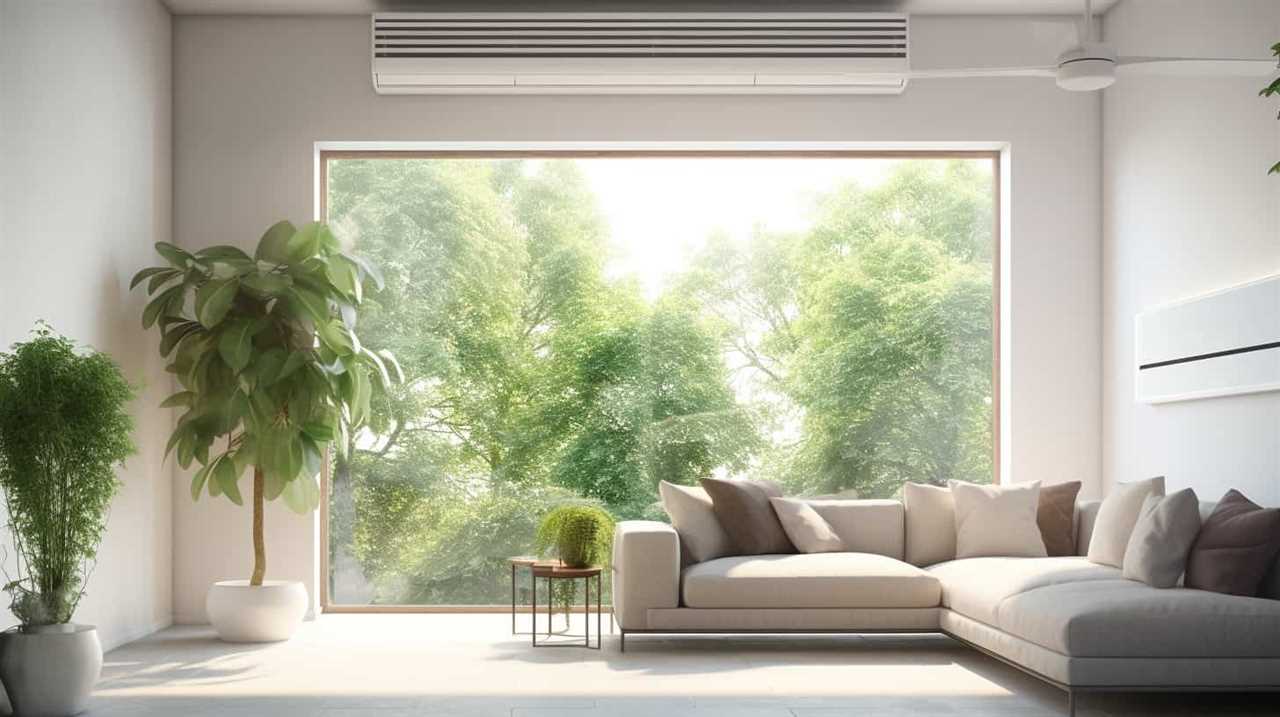
The cost analysis of installing a heat pump system involves considering the initial investment and the potential return on investment. While heat pump systems may have a higher upfront cost compared to traditional HVAC systems, the energy savings over time can quickly offset this expense.
With their high efficiency and ability to provide both heating and cooling, heat pumps can reduce energy consumption and lower utility bills. Homeowners can also take advantage of various incentives and rebates offered by government agencies and utility companies to further reduce the cost of installing a heat pump system.
Frequently Asked Questions
Are There Any Tax Credits or Incentives Available for Installing a Heat Pump System?
Yes, there are tax credits and incentives available for installing a heat pump system. These include financial incentives, energy savings, and government rebates. They can help offset the cost of installation and promote the use of energy-efficient technologies.
Can a Heat Pump Be Used for Both Heating and Cooling?
Absolutely! A heat pump is a versatile system that can provide both heating and cooling. Its efficiency and ability to transfer heat make it a valuable addition to any residential HVAC system.

How Long Does a Heat Pump Typically Last?
Heat pump typically lasts between 10 to 15 years with regular heat pump maintenance. Signs of a failing heat pump include reduced heating or cooling capacity, strange noises, and increased energy consumption.
Will a Heat Pump Work in Extremely Cold Climates?
In extremely cold climates, heat pumps may not work as efficiently as in milder conditions. However, some of the best heat pump brands have developed advanced technology to improve performance and maintain efficiency even in freezing temperatures.
What Is the Average Cost of a Heat Pump Installation?
The average cost of a heat pump installation depends on various factors, such as the size of the system, the complexity of the installation process, and any additional components required.
What Are the Steps to Optimize Residential HVAC with Heat Pump Technology?
When it comes to residential hvac optimization with heat pump technology, there are specific steps to follow. Begin by conducting an energy audit to identify areas for improvement. Next, ensure proper insulation to prevent heat loss. Regular maintenance of the heat pump system is crucial for optimal performance. Additionally, utilize programmable thermostats and set efficient temperature settings. Regularly clean or replace air filters to maintain efficiency. Finally, consider upgrading to a more energy-efficient heat pump model for further optimization.
Conclusion
In conclusion, heat pump technology is a game-changer in the world of residential HVAC systems. Like a conductor leading a symphony, heat pumps efficiently harness the natural energy around us to provide optimal comfort and savings.

With various types available, homeowners can choose the best fit for their needs. Compared to traditional HVAC systems, heat pumps offer superior energy efficiency and enhanced comfort.
As we look ahead, the future of heat pump technology holds even more promise, paving the way for a greener and more sustainable tomorrow.







